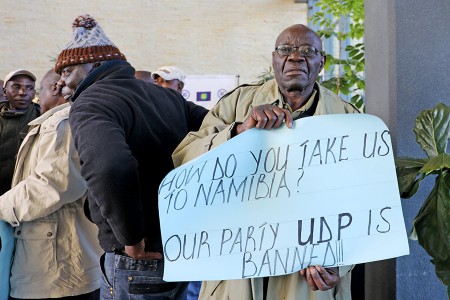Children thrown into Caprivi political fire
Thapelo Ndlovu | Friday September 13, 2019 14:16


Amongst the detainees are 30 students due to write national examinations, made up of 11 Standard 7s, 10 Form 3s and nine Form 5s. The exams are in a few weeks’ time.
The earliest statistics from sources near the refugee camp reported that 66 refugees, including their hand-cuffed leader, Felix Kakula were transported to the FCII last Friday (6/09/19) while an additional 69 were expected to have been moved on Monday (09/09/19). Kakula was initially isolated from others but was later reunited with them.
The development comes amid the simmering relations between the government of Namibia and the secessionist group of the Caprivi, most of whom have been living in Botswana on refugee status, which has since been withdrawn by the United Nations High Commissioner for Refugees (UNHCR).
This follows a Court of Appeal ruling early this month paving the way for the deportation.
While still assessing the situation for a substantial intervention, the Botswana Centre for Human Rights (Ditshwanelo) has since dispatched two letters to the Ministry of Defence, Justice and Security seeking clarity on the status of children rights, amongst them those with a Botswana citizen as either of the parents.
“Will these children be removed from the Dukwi Refugee Camp and from Botswana against their will? Will these children be allowed to stay in Botswana with their parents?” asks the director of Ditshwanelo, Alice Mogwe in a letter delivered this past Monday.
The centre requests for more details such as whether there has been prior arrangement for re-enrolling students upon arrival in Namibia.
School going children who are about to sit for their final examinations are also a concern to public opinion.
A concerned citizen and community leader, councillor Thatayaone Kehitile posted on social media, with the message: “I feel sorry for these young refugees, who had to abandon their studies in order to oblige to the repatriation exercise. Grant these kids their right to education, why deny them now to at least write their exams and pass.”
He further references to the #esengmongwaneng, a ‘protect the child campaign’, which was spear headed by UNICEF and the First Lady, Neo Masisi.
Contacted for comment, Kehitile describes a sorry situation.
“Schools are conducting mock exams as we speak ahead of national ones and refugee students are detained. These are usually our brightest cadres. This is sad,” lamented the civic leader.
The councillor is also concerned that the refugees have not been given enough time to get rid of their belongings and are now forced to sell them at give away prices.
The latest news to come from the area is an open letter from Nata Senior Secondary School students addressed to the First Lady. The students paint a poignant picture of how their colleagues were parked into a security van (combi) under heavy escort out of the school.
“Maam, we have witnessed our colleagues and classmates whisked away in a combi escorted by three members of the SSG.” The Special Support Group or SSG is a military wing of the Botswana Police Service infamously known for its brutal interventions during riots.
The student appeals to the First Lady to intervene and save their colleagues whom they consider victims of circumstances.
In the meantime, the situation is reportedly tense in Namibia, as the government is not hiding its exasperation to deal with whom it considers separatists.
In a video clip of 2018, emanating from the Namibia Broadcasting Corporation (NBC), the Inspector General of the Namibia Police (NAMPOL), Lt. Gen. Sebastian Ndeitunga minces no words in admonishing officers from failing to deal with dissidents.
The party that these refugees identify with has been banned. Apparently one of the conditions the refuges have put up for their return is the unbanning of their organisation. The police commissioner in the video clip is explicit that the government will act tough on dissidents.
“This is why the refugees are reluctant to go home. It is a clear sign that they will end up (being) persecuted and incarcerated.”
It is further alleged that the Botswana Government disregarded the refugees’ resettlement into other countries but forces them to go to Namibia.
“Some were concluding their move to this country (name known) but the deal has now been washed away. Why is government so determined to move these people to Namibia?”
Earlier this year, the Presidents of Botswana and Namibia, Mokgweetsi Masisi and Hage Geingob respectively, held some talks in which some undertakings were made. Masisi reportedly assured his counterpart that the Namibian nationals were no longer refugees but illegal immigrants and therefore would be returned home.
“President Masisi is on an appeasing mission, doing everything to be in good books with other African leaders,” said one observer, implying the refugees could have been sold out.
*Ndlovu is the coordinator of the Community Media Foundation
